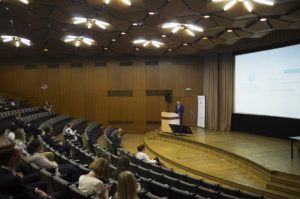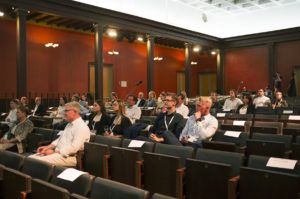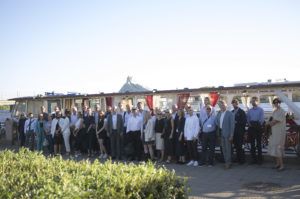Baltic Arbitration Days – 2020: from pandemic to arbitration
 Baltic Arbitration Days – 2020 focused on arbitration in transport-related disputes, IT, third-party funding within CEE and an update on investment arbitration.
Baltic Arbitration Days – 2020 focused on arbitration in transport-related disputes, IT, third-party funding within CEE and an update on investment arbitration.
The event hosted practitioners from, inter alia, Germany, Israel, Russia, Switzerland and Finland. Mr. Theis Klauberg (Klauberg Baltics, Riga) introduced the event by presenting the innovative hybrid onsite-online format of the conference due to Covid-19-related travel restrictions.
The Baltic Arbitration Days commenced on Saturday with a social event in Jurmala in an informal and friendly atmosphere. All participants had the opportunity to meet prior to the conference and watch the sunset from Latvia’s seaside.
Panel 1: Arbitration in transport-related disputes
Mr. Alexey Ponomarev (KDB.legal KOCH BOËS, Hamburg) opened the panel by explaining third party effects of arbitration clauses under German law. As a case study, Mr. Ponomarev referred to a recent decision from the Higher Regional Court (OLG) of Hamburg in which it had to decide about the arbitrability of a dispute between two shippers on the same vessel. In the case, both shippers had accepted the bills of lading with identical arbitration clauses, so the claimant applied to the OLG Hamburg with the request to declare arbitration against a second shipper admissible. The cargo of the second shipper had (allegedly) damaged the cargo of the first shipper due to improper packaging. Thus, the OLG Hamburg had to decide whether the duty to properly pack and label cargo is an obligation that has a protective effect on third parties.
Ultimately, Mr. Ponomarev argued that the OLG Hamburg dismissed the application merely because the packaging duty was considered to have a protective effect only for the carrier but not for other shippers.
Followed by Mr. Ponomarev’s presentation, Mr. Raphael Brunner (MME, Zurich) referred to the possibility of arbitration in road transport under CMR (art. 33). Mr. Brunner also mentioned the problems and hurdles of such arbitration in regard to the wording of the arbitration clause and seat of arbitration in a different state as the mandatory jurisdictions as per article 31 of the CMR.
Panel 2: Arbitration and IT
The panel started with Mr. Wojciech Sadowski’s (Queritius, Warsaw) presentation on GPT-3 features and potential uses of this and similar artificial intelligence (AI) systems in arbitration. Continuing with the AI discussion, Mrs. Tytti Saarinen (Forensic Risk Alliance, Helsinki) addressed the role of AI, in particular Continuous Active Learning (CAL), as a review platform for disputes and other legal cases such as large compliance and anti-bribery investigations.
 Coming from a background of data governance, technology solutions and forensics, Ms. Saarinen highlighted that the use of technology in reviewing large volumes of data is incipient and that there is plenty of space for development.
Coming from a background of data governance, technology solutions and forensics, Ms. Saarinen highlighted that the use of technology in reviewing large volumes of data is incipient and that there is plenty of space for development.
She added that the view of lawyers in regard to AI is often black and white: one alternative seems to be the human eye, which as such is often considered more reliable than technology; the other alternative being AI where technology would be fully replacing the human eye. Nonetheless, Mrs. Saarinen concluded by disagreeing with both arguments and emphasizing that rather the best advantages of both methods should be taken into use.
Expert lecture: New Russian law invites Russian businesses to breach jurisdiction agreements and arbitration clauses
After panel’s 2 discussion, Mr. Boris Karabelnikov (independent arbitrator and law expert, Riga) delivered a lecture on the new Russian federal law No. 171-FZ. He argued that such law provides Russian state arbitrazh (Russian state commercial courts) with exclusive jurisdiction over disputes affecting sanctioned Russian nationals including foreign entities connected to them.
The law disregards whether the parties previously agreed to be subjected to a foreign court’s jurisdiction or arbitral tribunal outside of Russia. Thus, Mr. Karabelnikov held that the new Russian federal law invites Russian businesses to breach jurisdiction agreements and arbitration clauses for being adjudicated by Russian state courts.
Panel 3: Third party funding in arbitration disputes in CEE
The panel started with the presentation of Mr. Leonid Shmatenko (Peter & Kim, Geneva) who compared third party funding in Russia and Ukraine. Mr. Shmatenko mentioned that both jurisdictions do not regulate third party funding and that no limitations or prohibitions on funding claims in civil and commercial proceedings exist.
Continuing his presentation, Mr. Shmatenko argued that third party funding in Ukraine is not well-known on the market and in practice; whereas Russia is considered a market favourable towards third party funding. Unlike in Ukraine, Mr. Shmatenko noticed that there are already Russian entites in the third party funding market such as NLF Group, Sudfinans and Platforma.
Then, Mr. Dmitry Pentsov (Florier, Zurich) referred to third party funding in Switzerland. He explained that third party funding in arbitration disputes in Switzerland is legal and that the jurisdiction does not directly regulate such activity but does it indirectly by regulating attorneys activities. As an example, Mr. Pentsov mentioned the decision of the Swiss Federal Tribunal of 22 January 2015 (2C_814/2014) in which the same lawyer simultaneously represented a client and was a litigation funder. Consequently, the Supervisory Commission of the lawyers of the Canton of Zurich sanctioned the lawyer for the violation of prohibition of conflict of interests.
To conclude the panel, Ms. Helen Lehto discussed the current situation of third pary funding in Finland. She explained that third party funding in Finland remains not yet well-known but that Finland likely follows the practice of other Scandinavian countries which are seemingly funder-friendly. Though, Ms. Lehto also emphazised that such assessment is challenging as there is a lack of precedents in Finland.
Panel 4: Investment arbitration update
Mr. Pierre-Olivier Savoie (Savoie Laporte, Paris) opened the last panel by discussing the UNCITRAL WG III process. He associated such process to the EU IIAs and the 2019 IIAs by identifying the trend in including or not ISDS provisions.
Following Mr. Savoie’s presentation, Mr. Scott Vessel (Three Crowns, Bahrain) referred to the IBA Guidelines on Conflicts of Interest in International Arbitration (IBA Guideline). Mr. Vessel explained that arbitrators and party representatives often remain unsure about the scope of their disclosure obligations but that disclosure of any relationship, no matter how minor or serious, may lead to unwarranted or frivolous challenges.
He added that in regard to disclosure obligations for arbitrators, the IBA Guidelines stipulate that “if facts or circumstances give rise to doubts as to the arbitrators impartiality, the arbitrator shall disclose such facts or circumstances”. Moreover, doubts from the disclosure of facts or circumstances “should be resolved in favour of disclosure”.
 Mr. Vessel concluded his presentation explaining disclosure obligations between arbitrators and experts. According to the IBA Guidelines, disclosure between an arbitrator and expert is required when a close personal friendship or enmity exists.
Mr. Vessel concluded his presentation explaining disclosure obligations between arbitrators and experts. According to the IBA Guidelines, disclosure between an arbitrator and expert is required when a close personal friendship or enmity exists.
Finally, Mr. Saar Pauker and Ms. Sapir Halima (Herzog, Fox & Neman, Tel Aviv) presented the state of ISDS in a pandemic world. They argued that ISDS will be used to address Covid-19-related claims against States. As examples, they highlighted Spain’s nationalization of private hospitals and Peru’s bill aiming at suspending the collection of toll fees on the country’s road network which could result in ICSID claims from concessionaires managing toll roads.
After the conference, participants had the opportunity to enjoy a dinner cruise along the Daugava river.
Carlos Jalil
Klauberg BALTICS Attorneys-at-law











